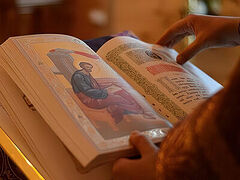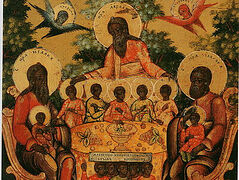Today ends the reading of the Gospels, and I would like to draw your attention to what this reading means and to what it obligates us. What does it mean to read all the Gospels on these days? It is a repetition of the testament given us by the Lord Jesus Christ. Having died for us, the Lord left a testament to all who have faith in Him—a testament written and signed with His Blood. Everyone who comes to the Lord by faith enters into a covenant with Him and undertakes to fulfill the testament left by Him, as depicted in the Gospels. Tomorrow His Passion will be accomplished. A day later, the image on the shroud of the Lord will be presented for us to venerate, after His removal from the Cross, tortured and pierced. The first thought of anyone who comes to kiss the shroud will be the thought of the covenant confirmed by the death of the Lord. With His depleted appearance and His wounds, He will remind each of us: Do you remember and do you fulfill My testament which you undertook to fulfill when you entered into a covenant with Me? So that every Christian could conscientiously answer before the shroud: “Yes, Lord, I remember Thy covenant and I know the testament,” the holy Church decided to read all the Gospels before the sufferings of the Lord, in order to refresh in everyone’s memory the whole picture of the obligations bequeathed by the Lord.
This is why all the Gospels are read on these days! So, is the goal being achieved? Yes, to a greater or lesser degree. Does everyone know what the Lord expects from him as a Christian? Perhaps not everyone clearly understands the whole essence of the work bequeathed to us—perhaps he has failed to consider all the obligations imposed by the Testator, perhaps he didn’t depict everything related here in one general picture. I am undertaking to help you, and to depict the entire contents of the testament of Lord in one small outline. This will help us before the face of the suffering Lord, either to strengthen ourselves more in life, if it’s been amended, or will prompt us to change and amend it if it’s disordered.
You know that the essence of Christianity consists in the restoration of fallen man. In his creation, man is appointed to be in communion with God, to live in Him and be blessed. By transgressing the commandment, he fell away from God, he lost the true life, and had to suffer both temporally and eternally. The Only-Begotten Son of God, having taken human nature upon Himself, revived it within Himself, and satisfied the righteousness of God by His death, and returned man to blessedness in God. That people might be able to assimilate these benefits at all times, He established the holy Church on earth—the house of salvation and the court of the saved. Anyone who now desires to achieve his purpose—to taste of the blessedness of communion with God—can be vouchsafed this only through communion with the Lord Jesus Christ in the holy Church. No man cometh unto the Father, says the Lord, but by Me (Jn. 14:6). This is the essence of His testament to us. Hence, it goes without saying that the more specific points of this testament relate to: 1) the paths of ascending to communion with Jesus Christ, 2) remaining in God through communion with the Lord, 3) remaining in the Church, where all the force and ways to accomplish both are to be found.
1. How can we ascend into communion with the Lord, and what is therefore required of us?
The path of ascension to communion with the Lord consists in the following: Coming to repent of his sin, man would be ready to fall into despair if the Lord didn’t come to him with due merits. Assimilating them to himself by faith in the Lord Jesus Christ, he arises to the hope of salvation and acceptance of the Divine powers; he assumes the intention to work for the Lord all the days of his life, and thus he is united with the Lord through the Sacraments. Consequently, this is what’s required of every Christian:
A. Know and perceive your poverty and wretchedness, that you’re poor and blind and naked, and that you would perish both temporally and eternally if not for the Lord.
B. Know and grow in the knowledge of the Lord Jesus Christ, Who came into the world to save sinners—He satisfied the righteousness of God for you, He quickened you in Himself and made you to sit on the right hand of the Father in Heaven.
C. Believe with full faith that the Lord, Who saved the entire world, is saving you too, and with Thomas cry out to Him: My Lord and my God.
D. Because of all this, have hope that you’ll be saved. Keep in your heart the thought that the danger has already passed; don’t give in to carelessness and luxury, but go about in deeds of self-denial, for in forgetting this, how many times you have plunged into trouble.
E. Kindle a sense of peace with God. Contemplate in the spirit the bright benevolent face of God; but don’t only not give in to the passions, but also to passionate thoughts, and any time they pierce through against your will, make haste to cleanse yourself with tears of repentance; or ever remain in tears of repentance, thereby cleansing all impurity.
F. Bear in your heart the conviction that you are the son of God, to whom authority is given to call to Him: “Abba Father”—and remembering this, act as if on behalf of God, in the sight of God, for God—always to the glory of His all-holy name.
This is the first series of sensibilities and dispositions bequeathed by the Lord!
2. Having entered into communion with Jesus Christ, and having been reunited with God through Him, man stands before the face of God, from Whom he fell away, and contemplates Him in His infinite perfections, and in His works of creation, His care, and His fulfillment of everything… And these are the sensibilities and dispositions with which everyone should be filled! This, therefore, is what the Lord requires of each of us:
A. Contemplating God as the most sacred and incomprehensible, marvel at Him. May every thought fall silent in you, as every creature of Heaven and earth is silent before Him.
B. Contemplating Him as infinitely great, fall down before Him in abasement, penetrated with reverent fear and trembling.
C. Contemplating Him as all-perfect, praise and glorify Him, calling out to Him together with the choirs of angels: Holy, holy, holy Lord of Sabaoth, Heaven and earth are full of Thy glory!
D. Contemplating Him as everywhere present, all-seeing, and all-fulfilling, walk before His face as before a king who is looking upon you.
E. God created you to keep you—you are entirely His. Submit to Him as the Lord of life, in a sense of complete independence on him.
F. God created you and provides for you: Everything that is His has become yours. Thank Him for everything. Be gracious and endure if something unpleasant comes upon you, and never allow a sense of satisfaction with the disposition of providence towards you to weaken within you.
G. God, Who controls everything, guides you to His purpose. Therefore, everything that happens to you will be from God. So commit yourself to the will of the all-good God, Who knows better than you what you need—find rest in Him, not allowing yourself to be tormented by empty confusion and ruin of spirit; and nourishing full hope that He will lead you to His end, ascend to Him in mind and heart, in prayer.
H. God, Who created and controls everything, will put an end to the present order of things, transfigure Heaven and earth, and establish an eternal kingdom of blessedness for man. And so await this Second Coming of the Lord, and don’t just believe in Him, but desire and prepare to meet Him at every hour. Prepare for death—remember the Judgment, Paradise, and hell, and be like a pilgrim on earth.
This is the second series of sensibilities and dispositions bequeathed by the Lord!
3. Those who enter into communion with Jesus Christ, and through Him with God, achieve this in no other way than in the holy Church, according to its instructions and guidance, and are confirmed and remain in this communion in no other way than in communion with the Church. In the Church, all the means of grace necessary for this, and all who are in it and use these means and who turn to God, become one body, filled with one spirit. The Church is the home of salvation or a vessel of grace-filled means, and the court of the saved.
A. The Church is the home of salvation or a vessel of grace-filled means. And so turn to it and seek satisfaction of your spiritual needs within it. Everything you need, you’ll find within.
1) You need enlightenment of the mind. The Church is an educator. Believe and keep in your heart that it alone is the pillar and ground of the truth—and seek this truth in it—in the word of God, in the Patristic writings, in the teaching of the Church. According to the guidance of this enlightenment, seek out all the rest, and thereby come to believe in this enlightenment.
2) You are weak—you need reinforcement. The Church is the giver of grace and nurturer of the spirit of grace. Our Mother has seven paps—the seven Sacraments. Approach them with faith, and drink of life-giving powers from them according to your needs, and then inflame these powers by walking in all the statutes and rites of the Church—the fasts, preparation for Communion, and all the rest.
3) You are surrounded by enemies. You need intercession and protection—the Church is your intercessor and protector. Go to the churches of God. Gathering its children, the Church brings its intercessory power down upon them. Here is the bloodless Sacrifice, here are the choirs of angels and saints, here are prayers for every need of soul and body. Run here, and protect yourself with the prayer of the Church.
B. The Church is the court of the saved. All the faithful are one body with one spirit. Thus:
1) Remain in unity of spirit with everyone—be of one mind, not looking for independent views in matters of faith, which is where heresy comes from. Be sympathetic with all and ready to contribute to the good of all. These are the three elements of true love, which will then teach you to greet every brother with a good disposition, benevolence, and good care; love will teach you to treat each person with honor, and keep your view of each one pure; it will teach everyone to sacrifice for the good of his soul and body, and, in constant mutual exchange, to be sincerely cordial, modest, peace-loving, yielding, truly loving, and so on; it will teach you to behave this way not only in relation to benefactors and friends, but also to enemies and the ill-disposed.
The Church is the court of the saved—all the faithful are one body with one spirit…
2) Be zealous with all zeal to be in unity with it and to bring yourself into the same spirit with it. And to this end, remember the vows given when you entered it in Baptism and renew them in your memory more often; deny yourself and continually offer yourself as a sacrifice to God. Submit your mind to him and receive the mind of Christ; destroy your will and walk only in the will of God; submit your heart and love nothing but Him; submit your body to Him in bodily labors and exertions for the sake of salvation. Be sober and vigilant, and preserve your senses undissipated.
This is the third series of feelings and dispositions bequeathed to us by the Lord!
There are also other special testaments—to parents and children, husbands and wives, servants and masters, superiors and subordinates, pastors and shepherds, sellers and buyers, judges and the judged, to every calling and condition: But they’re already self-evident from the first testaments. May the spirit of love and self-sacrifice to zealously work the one will of God, to which our entire life should be devoted, rule everywhere.
This is a brief outline of the testament left us by the Lord, and this is what the Church wants to produce in our mind by reading all the Gospels to us in these days—to present us with unashamed face at the foot of the Cross, upon which hangs the One Who made this covenant with us; to present us as aware of, if not entirely fulfilling everything.
But, brethren, what’s in knowledge?! It will only convict us! Let’s push our soul a little—won’t it be zealous to add work to knowledge?! Is there little time?! No, not a little. Everything can be fixed in one minute. Let us do this: Let us trust our lives according to the proposed outline, and everything that we find wrong, let us wash with tears of repentance, with the firm intention of amending ourselves wherever we have hitherto been disordered. The Lord, suffering for us upon the Cross, will accept the intention as the deed itself, if only it's sincere and accompanied by a willingness to remain in until the laying down of our lives.
Let us at least please the Lord with this—remembering Him in these days. There was a time in the Old Testament when the books of the Law were read aloud to all the people, with curses for the disobedient and blessings for the obedient, and all the people answered: All that the LORD hath spoken we will do (Ex. 19:8). Behold, the Lord Himself repeats His covenant to us from the Cross; let us open our hearts, let us develop our sensibilities and dispositions according to what has been written, and say: Lord, let us keep all that You have commanded, even were we to go to prison or to death for it.
Amen.
March 30, 1860





